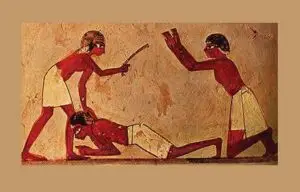The saga of Abraham, Israel’s first ancestor, occupies about fourteen chapters, or roughly twenty pages, in the biblical book of Bereshit (Genesis)
“More than any other patriarchal figure,” writes author Amy Dockser Marcus- “Abraham remains a vivid, living presence, a familiar part of daily life—and daily politics—of the Middle East.”
An estimated 54% of the world’s population, some 3.8 billion people, revere him as the common ancestor of all religions of Semitic origin, principally Judaism, Christianity, and Islam, but also religions with smaller adherents, including Rastafarianism, Samaritanism, Druzism, Mandaeism, Bábism, and the Baha’i Faith.
It would stand to reason, then, that considering the claimed shared origins, the figure of Abraham would serve as a unifying religious factor. It does not.
As Jon D. Levenson, a professor of Bible at Harvard, notes, “There are at least three Abrahams, not one, and in each religion, he is in relationship with a living God who has called a particular community to his service.”
Each one of the “Abrahamic religions”—as those religions that count Abraham as their ancestor are called—claims the first three verses of the Book of Genesis, chapter 12 to refer exclusively to them:
And I will make you a great nation, and I will bless you and make your name great, and you shall be a blessing. And I will bless those who bless you, and those who damn you I will curse, and all the families of the earth through you shall be blessed.”
The ideas of chosenness or election in Judaism and Christianity and of Abraham’s fearless opposition to idolatry in Judaism and Islam are just some of the conclusions the different religions distill from reading these verses.
Some of the implications drawn from these verses by the different religions include the concepts of election in Judaism and Christianity, as well as Abraham’s firm opposition to idolatry in Judaism and Islam.
Even though scholars agree for the most part that Abraham must have existed, it still remains extraordinarily difficult to determine conclusively the historicity of such an ancient religious figure.
The Abraham of the Abrahamic religions is, in fact, more the result of centuries of accrued traditions than the figure found in the Hebrew Scriptures.
Each of the Abrahamic religions seems oblivious to the fact that Abraham lived before there was a Torah, a gospel, and a Qur’an; or, as religious scholar Karen Armstrong puts it, “before the religions of God had split into warring sects.”
The Abraham of the Hebrew Scriptures certainly shows virtues quite different than those claimed by the Abrahamic religions.
Contrary to later traditions, for instance, the biblical view gives no support to the theory that Abraham originated the idea of the one God or founded a congregation of monotheists. Abraham’s life and acts are not religious but cultural and historical. He does not pray; he does not observe rituals. As Professor Levenson says, “It is not simply that in Genesis, Abraham does not teach what Moses is said to have taught; it is that he does not teach anything at all.”
The late Israeli philosopher and biblical scholar Yehezkel Kaufmann pointed out that although the TaNaKh does not portray Abraham as a fighter for God, it does depict him as a God-fearing and moral man. He pursues peace, is generous and hospitable, and intercedes on behalf of the Sodomites. Furthermore, he charges his descendants to observe ‘the way of the Lord’ to do righteousness and justice. Abraham may thus be regarded as a pious ‘prince of God’ among his tribe, who aspired to a noble, moral faith, which he bequeathed to his descendants.
However, his importance to the history of religion is that he is a countercultural hero, one that smashed the conventional icons of his day to see a revolutionary new civilization.
An authentic Abrahamic tradition, Jewish, Christian, or Islamic, would be one that would follow the reason given in the Torah for Abraham’s preeminence:
For I have singled him out, that he may instruct his children and his posterity to keep the way of the Lord by doing what is just and right
Bereshit 18:19


